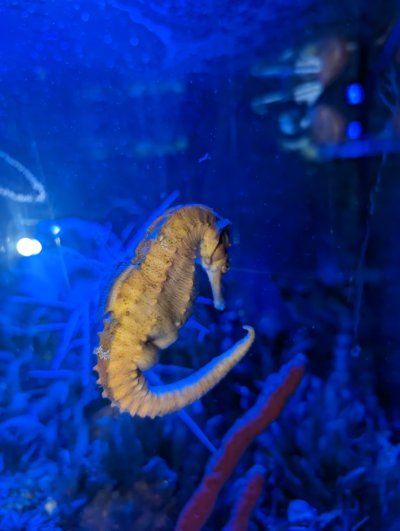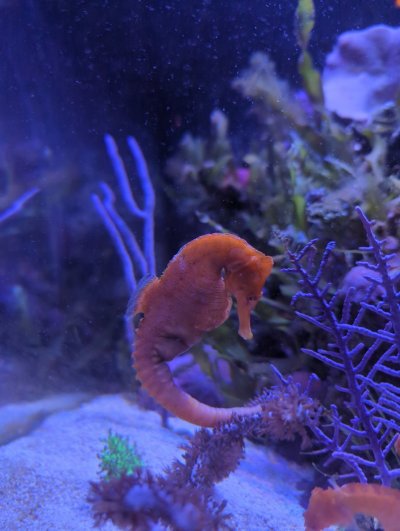Navigation
Install the app
How to install the app on iOS
Follow along with the video below to see how to install our site as a web app on your home screen.
Note: This feature may not be available in some browsers.
More options
You are using an out of date browser. It may not display this or other websites correctly.
You should upgrade or use an alternative browser.
You should upgrade or use an alternative browser.
Is my seahorse dying?!
- Thread starter lulu1228
- Start date
- Tagged users None
U can refer this https://seahorsesavvy.com/blogs/new...f-gas-bubble-disease-how-to-treat-and-prevent.
There is very less chance of curing gas bubble disease
#reefsquad #fishmedic
The tail of the seahorse looks swollen, so I’m guessthis is GBD in his tail (the usual spot for GBD in a lot of cases).
The exact cause of gas bubble disease is unknown, but it is believed by many to be caused by bad water quality (dissolved organics, which cannot be assessed through nitrate and phosphate unless you trend the nitrate and phosphate buildup of your tank over weeks, and you can then estimate based on information on waste breakdown, but that gets a bit complicated). You can also try to get a triton n-doc test done, but it may take weeks for you to get the results back.
If your tank is a seahorse specific tank, and it is more than a year old, I recommend doing 25% water changes daily for 5-6 days to reduce some of the buildup in the water, and, if nothing else, at least it’s a precaution.
the known, tried and tested treatment for gas bubble disease is to move the seahorse to a separate tank and treat with diamox, which you need to get from a vet (it’s prescription only). you may need to call around to see if any vets in your area treat fish, and if they do, explain the situation to them and ask for the diamox. They may make you bring the seahorse in, but, if you really want to save him, then that’ll be what it takes.
If you cannot get a hold of diamox, you can try to move it to a separate tank and perform 100% water changes daily (50% twice a day) until the symptoms subside. Sometimes if the seahorse was healthy enough before hand, by putting them in a clean environment, their immune system can knock it out, but, that can be a 50/50 shot.
another option is you can try to treat the seahorse in a separate tank with a combination of amoxicillin and doxycycline or a combination of ciprofloxacin and doxycycline for 10 days to kill the disease (50mg of doxy and 250mg of cipro or amoxicillin, but do not use not cipro and amoxicillin together). I have done this with 2 of my own seahorses which could no longer hold onto anything because their GBD got so bad (I was still learning), and had complete recovery of both. A year later and the GBD never came back, but I also run a chiller and do 25%-30% water changes weekly.
the method is to dose 50mg or doxy and 250 of cipro or amoxicillin daily to every 5 gallons of water, with a 75-80% water change daily before administering the new dose (100% is better, but if you can’t do this 75% is the minimum). Do this for 10 days, then stop the dosing but continue the daily water changes until the seahorse looks completely healthy again. It will take 3-4 weeks for natural recovery using this method, but it’s been successful for me (but, while my seahorses were is very bad shape, they were very healthy before the onset of the GBD, but your seahorse looks to have been very healthy as well).
good luck and keep us posted.
The exact cause of gas bubble disease is unknown, but it is believed by many to be caused by bad water quality (dissolved organics, which cannot be assessed through nitrate and phosphate unless you trend the nitrate and phosphate buildup of your tank over weeks, and you can then estimate based on information on waste breakdown, but that gets a bit complicated). You can also try to get a triton n-doc test done, but it may take weeks for you to get the results back.
If your tank is a seahorse specific tank, and it is more than a year old, I recommend doing 25% water changes daily for 5-6 days to reduce some of the buildup in the water, and, if nothing else, at least it’s a precaution.
the known, tried and tested treatment for gas bubble disease is to move the seahorse to a separate tank and treat with diamox, which you need to get from a vet (it’s prescription only). you may need to call around to see if any vets in your area treat fish, and if they do, explain the situation to them and ask for the diamox. They may make you bring the seahorse in, but, if you really want to save him, then that’ll be what it takes.
If you cannot get a hold of diamox, you can try to move it to a separate tank and perform 100% water changes daily (50% twice a day) until the symptoms subside. Sometimes if the seahorse was healthy enough before hand, by putting them in a clean environment, their immune system can knock it out, but, that can be a 50/50 shot.
another option is you can try to treat the seahorse in a separate tank with a combination of amoxicillin and doxycycline or a combination of ciprofloxacin and doxycycline for 10 days to kill the disease (50mg of doxy and 250mg of cipro or amoxicillin, but do not use not cipro and amoxicillin together). I have done this with 2 of my own seahorses which could no longer hold onto anything because their GBD got so bad (I was still learning), and had complete recovery of both. A year later and the GBD never came back, but I also run a chiller and do 25%-30% water changes weekly.
the method is to dose 50mg or doxy and 250 of cipro or amoxicillin daily to every 5 gallons of water, with a 75-80% water change daily before administering the new dose (100% is better, but if you can’t do this 75% is the minimum). Do this for 10 days, then stop the dosing but continue the daily water changes until the seahorse looks completely healthy again. It will take 3-4 weeks for natural recovery using this method, but it’s been successful for me (but, while my seahorses were is very bad shape, they were very healthy before the onset of the GBD, but your seahorse looks to have been very healthy as well).
good luck and keep us posted.
Last edited:
Just realized this post is over two weeks old, so, apologies on that, but, possibly information for next time (though I hope there isn’t a next time for you and the horses are doing well).
Similar threads
- Replies
- 21
- Views
- 348
- Replies
- 2
- Views
- 127
















